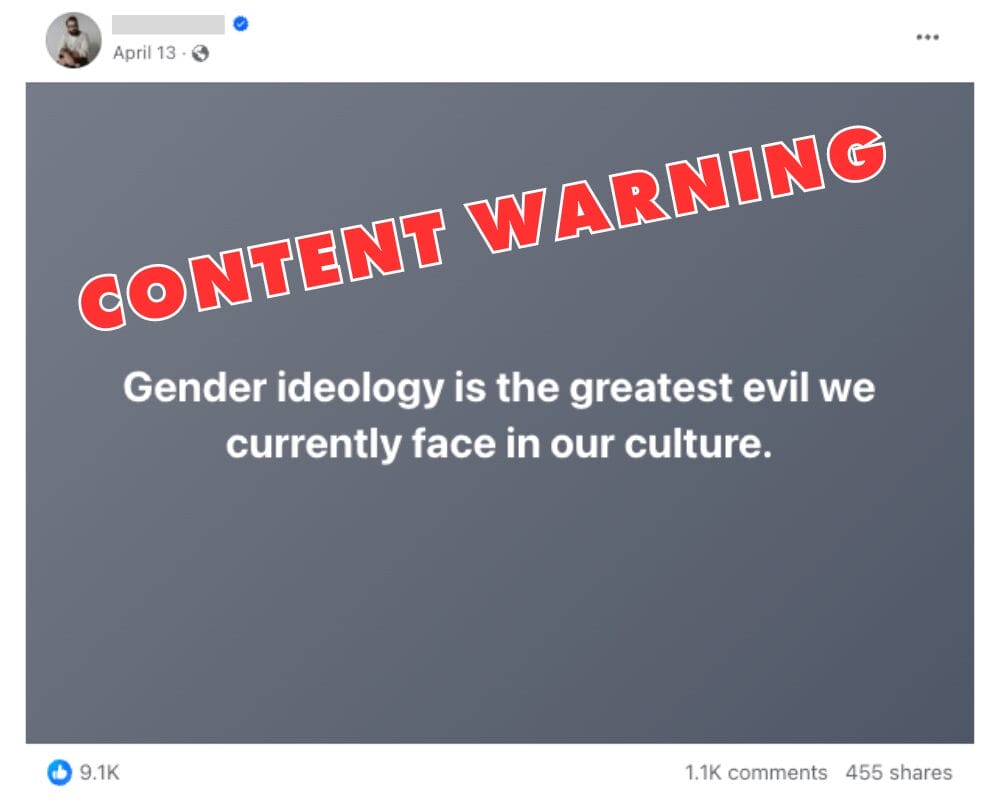Online Anti-LGBTQ Hate Terms Defined: “Gender Ideology”
This entry is part of the GLAAD Guide to Anti-LGBTQ Online Hate and Disinformation, an ongoing project to identify some of the most prevalent and egregious terms, tropes, and concepts that are used to harass, attack, and spread malicious misinformation about LGBTQ people on social media. Learn more here.
*CONTENT WARNING*
The example below includes a hateful term, phrases and imagery.
“Gender Ideology”

Employed by prominent anti-LGBTQ accounts and similar to the trope “transgenderism,” “gender ideology” is a malicious rhetorical construct that falsely asserts that LGBTQ — notably trans — people are an ideological movement rather than an intrinsic identity.
The Southern Poverty Law Center notes: “Like the term ‘gay agenda,’ the term is used as a talking point to demonize LGBTQ+ people. Anti-LGBTQ+ groups often employ the term to claim any kind of positive affirmation of trans young people is a nefarious method of creating or recruiting new trans kids.” On X, for example, far-right outlet The Daily Wire widely promoted a speech by anti-trans commentator Matt Walsh, who said in April 2023, “I truly see the fight against gender ideology as the last stand for Western civilization.” Other extremist accounts have used the phrase as a dog whistle to spread animus against trans people. That same month, Gays Against Groomers posted across Facebook, Instagram, and Twitter/X: “Gender ideology must be completely abolished and destroyed.”
According to some studies researching the origin of the phrase, “gender ideology” as an anti-LGBTQ trope can be traced back to Catholic conservative groups in the U.S. in the 1990s. In recent years, anti-LGBTQ groups, commentators, and political figures around the world have employed the phrase — on social platforms, in mass media, and in legal contexts — to dehumanize trans people and oppose LGBTQ rights. As part of an abhorrent coordinated effort to retract the fundamental civil rights of transgender people in the U.S., on January 20, 2025, President Donald Trump issued a hate-filled Executive Order, enlisting this false and harmful trope.
Conclusion
This is just one example of anti-LGBTQ online hate and disinformation. Every term and concept should be evaluated in context. For instance, LGBTQ people and allies may use hashtags with hate terms as counterspeech, or slurs such as “tranny” or “dyke” may be used self-referentially to reclaim them. This guide will be updated on an ongoing basis. Please see the latest GLAAD Social Media Safety Index report for a deeper exploration of the current social media landscape for LGBTQ people, including GLAAD’s recommendations and thought leadership in the field.
How to Report Anti-LGBTQ Online Hate Speech and Harassment
Every major social media platform has policies which prohibit hate and harassment on the basis of protected characteristics, including sexual orientation and gender identity. To learn how to report potentially violative content, check out GLAAD’s LGBTQ Digital Safety Guide, which includes basic tips on helping our community be more safe online.
About the GLAAD Social Media Safety Program
As the leading national LGBTQ media advocacy organization, GLAAD is working every day to hold social media platforms, tech, and AI companies accountable, and to secure safer online spaces for LGBTQ people. The GLAAD Social Media Safety Program produces the highly-respected annual Social Media Safety Index (SMSI) and researches, monitors, and reports on a variety of issues facing LGBTQ social media users — with a focus on safety, privacy, and expression.












